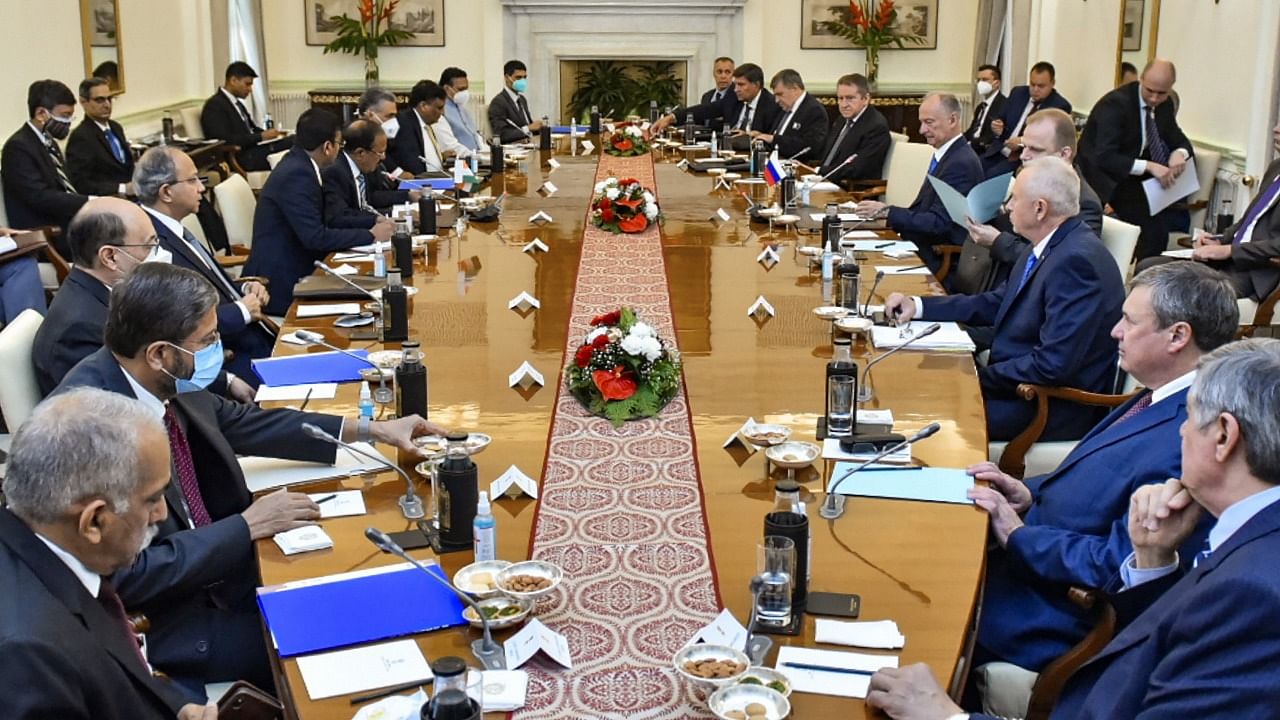
India and Russia on Wednesday discussed the situation in Afghanistan, but refrained from directly criticising the lack of inclusivity in the new Taliban government in the conflict-ravaged country, or atrocities on people protesting against the militant organisation and its mentors in Pakistan.
New Delhi conveyed to Moscow that Pakistan had a ‘special responsibility' to prevent use of the territory of Afghanistan for exporting terror to India and the Central Asian nations.
Prime Minister Narendra Modi’s National Security Advisor Ajit Doval had a meeting with his counterpart in the Russian government, Nikolai Patrushev, in New Delhi and expressed “deep concerns” over developments in Afghanistan, where the Taliban had taken over the national capital after occupying many provinces in a swift military campaign taking advantage of the withdrawal of troops by the United States.
Doval hosted Patrushev just a day after the US Central Intelligence Agency (CIA) chief William Burns visited New Delhi and met him as well as other officials to discuss the situation in Afghanistan. The National Security Advisor had last week also played host to the chief of the United Kingdom’s intelligence agency, MI6, Richard Moore in New Delhi.
The Taliban on Tuesday announced an interim Afghan government, which would comprise of people of only one ethnic community out of 55 in Afghanistan, would be led by people under United Nations sanctions and driven by the clerics, with no participation of women. New Delhi had earlier signalled that it would like to see an inclusive government in Kabul. But it on Wednesday refrained from making any comment on the structure of the new government in Kabul. Russia also did not make any comment on the lack of inclusivity in the new Taliban government.
“The importance of defining parameters of the future state structure of Afghanistan by the Afghans themselves, as well as the need to prevent the escalation of violence, social, ethnic and confessional contradictions in the country, were emphasised,” the Embassy of Russia in New Delhi said, in a statement issued after Doval-Patrushev meeting.
A source in New Delhi said that the top security czars of India and Russia had convergence of views on the need for Taliban to adhere to its promises of not allowing the territory of Afghanistan to be used to threaten or attack any other country or to export the menace of terrorism. They expressed concern over radicalisation and extremism, and the presence of international terrorist groups in Afghanistan, as well as threat emanating from terrorism to Central Asia and India.
Doval and Patrushev also discussed flow of weapons left behind by the United States to the terrorist groups within and beyond the boundaries of Afghanistan, a source said. India and Russia also shared concerns over the possibility of Afghanistan becoming hub of opium production and trafficking.
India emphasised Pakistan's links with Taliban and other international terrorist groups operating in Afghanistan.
Doval highlighted during his discussion with Patrushev the links of Pakistan’s military spy agency Inter Services Intelligence with terror organisations based in and outside Afghanistan, including the Lashkar-e-Taiba (LeT) and the Jaish-e-Mohammad (JeM). He also expressed New Delhi’s concerns over security of minorities, including Hindus and Sikhs in Afghanistan.
Watch latest videos by DH here:
